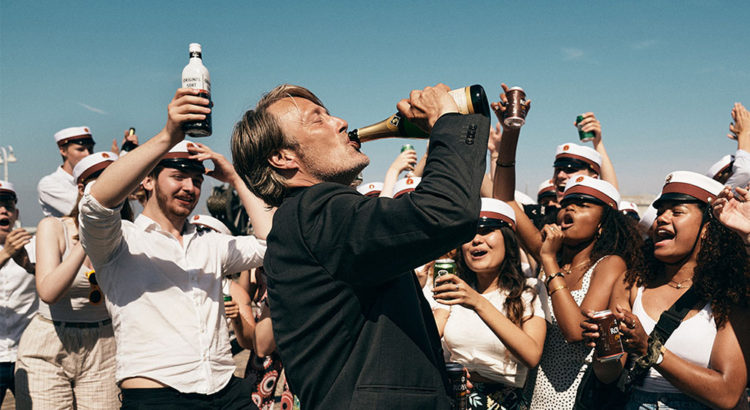In the world of film, nearly every drug and substance has had its day in court. Entire films and TV shows berate a single drug that ruins our protagonists’ lives, be it meth in Breaking Bad or heroin in Requiem for a Dream. And despite how difficult to watch these stories are, they are utterly believable—even for the majority of viewers who haven’t touched anything stronger than that one time at a college party when they did cocaine and woke up with the worst hangover they’d ever had. For the outsider looking into the world of drug addiction, it just feels obvious that “hard drugs” would lead to these downward-spiraling narratives of crippling addiction, broken homes, and dead friends. But where is alcohol in the canon of addiction stories?
In Danish director Thomas Vinterberg’s latest film, Another Round, Mads Mikkelsen (of Hannibal fame) pla ys Martin, a depressed high-school teacher who bands together with three of his similarly unfulfilled and aging teaching buddies to test out a radical new theory: that human beings were born with a blood-alcohol content 0.05% too low. Thus, achieving a constant state of 0.05% BAC will lead to increased stimulation, happiness, and ultimately purpose. So, the gang begins the experiment and starts drinking at work, pushing the limits of their alcohol tolerance as well as their ability to maintain a professional and social life.
ys Martin, a depressed high-school teacher who bands together with three of his similarly unfulfilled and aging teaching buddies to test out a radical new theory: that human beings were born with a blood-alcohol content 0.05% too low. Thus, achieving a constant state of 0.05% BAC will lead to increased stimulation, happiness, and ultimately purpose. So, the gang begins the experiment and starts drinking at work, pushing the limits of their alcohol tolerance as well as their ability to maintain a professional and social life.
The film opens with a scene featuring Martin’s students participating in a high school drinking game. The setting is a beautiful summer lakeside and everyone is very happy, carefree, and young—really, it feels more like summer camp than teenage debauchery. For the rest of the film, we watch as Martin and his very not happy, not carefree friends try to find more purpose in their jobs by drinking alcohol. It’s an asinine plan that the viewer knows will only end in misery, but we watch them try anyway because there’s a bit of humor to it, and, I think, we want them to find more meaning in their lives.
As Martin starts to rekindle his relationship with his wife, we cheer him on when the screen cuts to black and proclaims his BAC: 0.00%. We hope for the very best, that Martin can get what he wants from his job and from his marriage, and can still get put down the bottle. It seems obvious that alcohol can only do so much for his very cold relationship with his wife, yet when things between them explode and Martin retreats to a messy, ugly drinking session with the gang (who have all similarly screwed something up), we too feel defeated, messy, and ugly. Things look very grim in the film’s third act, and it’s hard to see any light at the end of the tunnel.
Luckily, the film ends with Martin’s renewed hope to restore his marriage, and he breaks out into dance with his newly-graduated students, impressing them with his passionate, skillful interpretations of jazz ballet. He drinks a beer, but so are all of his students and thus feels casual. Besides, his focus seems much more so on dancing than his bottle. Purpose, for Martin—via the students that love him, the prospect of getting his wife back, and his old passion for dancing—seems to not require alcohol. Though in the film it doesn’t play out in a way that sounds this wholesome and corny, love and passion are what seems to save Martin from addiction. We can only hope that these newfound purposes are enough.
As expected, Martin and his friends’ experiment ends in disaster and most of them lose huge pieces of themselves in the process, be it their job, their spouse, or their life. In that way, this addiction story is no different than Requiem for a Dream or (in more recent years) Beautiful Boy. Where this film stands out, then, is in its exploration of the interplay between society and alcohol, and how one is able to go from healthy-enough social drinking to alcoholism. The happy-go-lucky drinking of the teenagers in Martin’s class is depicted as a goal that becomes further and further from the reach of the gang’s experiment. As they withdraw further from society—and each other—into drinking, it becomes clear what Vinterberg is trying to tell us about alcohol: that the more we lose purpose and disconnect from our fellow human beings, the less healthy drinking becomes. Martin’s hope for the future at the end of the film is thus to reconnect with those who give him purpose, those who inspire him to dance more than he drinks.
Enjoy responsibly—together.
Another Round (2020) is available to rent on Youtube and Amazon Prime.



